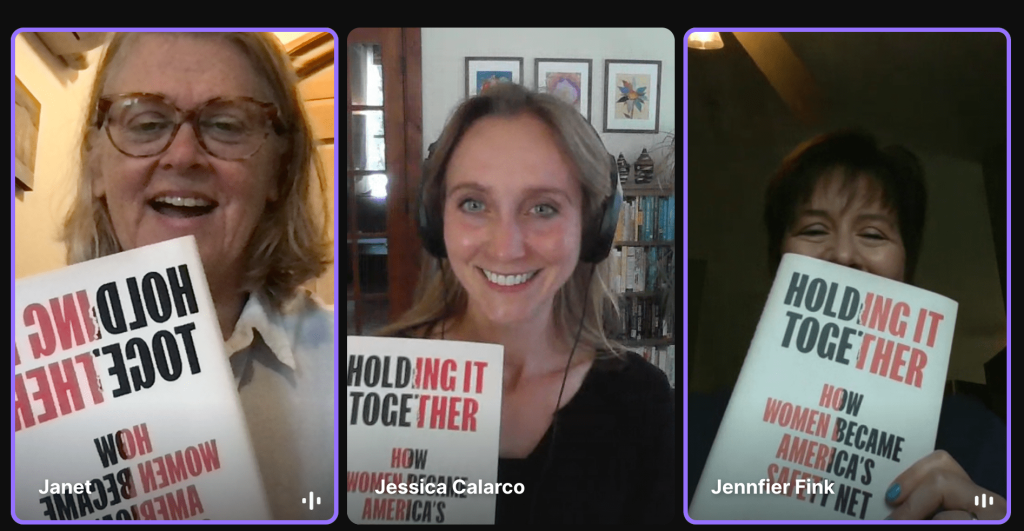使用Player FM应用程序离线!
Women are America’s Safety Net & That’s a Problem for Boys
Manage episode 425898352 series 2125047
Women are America’s safety net.
Women provide the vast majority of child and elder care and care for the disabled. Women do the bulk of home- and community-tending, and they create and reinforce the ties that bind us together. Most of that labor is unpaid — and the little that is paid is typically poorly compensated.
This imbalance is clearly problematic for women, who are often exhausted and overworked. But it’s also a problem for boys, men, girls, and, well, everyone. If we don’t talk about this imbalance, our sons will grow up in a system that still devalues care work. They’ll see women, predominantly, as caregivers, and may conclude – incorrectly – that they’re not capable of childcare or elder care. Others may also assume that our boys and men aren’t capable of care.
How Our DIY Society Tricked Us All
Other countries use social safety nets to manage risk, says sociologist Jessica Calarco, author of Holding It Together: How Women Became America’s Safety Net. In contrast, the US “tries to DIY society,” Calarco says, essentially telling people “that if they just make the right choices for their kids and families, then they won’t actually need any support.”
That’s a lie, though. We all need help and support at various time throughout life. But “women’s unpaid and underpaid labor is maintaining this illusion that we can get by without a social safety net” in the United States, she says.
Busting Gender Stereotypes
From the time girls are old enough to hold a baby doll, we’re training them to be mothers. We don’t do the same for boys, at least not on a society-wide scale.
“Boys are often denied the opportunity to learn to be caregivers,” Calarco notes.
Despite the ubiquity of the Mars/Venus myth, which suggests that females are better suited to caregiving than males, there’s no solid scientific evidence to back up that assertion. “If anything, much of what we perceive as these innate gender differences roots back to early socialization,” Calarco says. “Even as young as infancy, adults treat babies differently if they perceive it to be a girl versus if they perceive it to be a boy.”
Research shows that the more caregiving experience an individual has, the more that person’s body will respond physiologically — by pumping out hormones like oxytocin — to caregiving activities. “This happens for both men and women,” Calarco says. “The more experience you have in caregiving capacities, the better at it you get.”
But while parents (and society at large) are now widely supportive of girls who bend traditional gender boundaries, they are much less comfortable with boys who bend and challenge gender stereotypes. Many parents (and grandparents) still aren’t comfortable giving boys dolls or letting them play house.
“This is a place where we can intervene,” Calarco says. “We can hold up examples of kids and adults pushing back against these boundaries and binaries. We can let them know ‘there’s many, many different ways to be a girl and many different ways to be a boy.’ And I think the more that we can encourage that kind of gender flexibility for both our boys and our girls, the better off they will be.”
Takeaways:
- Women are the safety net of America, providing unpaid and underpaid labor that holds everything together
- Systemic issues affect boys and families
- Devaluation of care work impacts societal perceptions of caregiving roles
- How neoliberalism and the myth of individualistic success have led to the exploitation of women’s labor
- The Mars/Venus myth perpetuates gender stereotypes and societal attitudes that devalue caregiving and reinforce gender hierarchies
- Fundamental shifts in societal attitudes and policies are necessary to address systemic issues and create a more equitable society
- Change begins at home, with the need to challenge gender roles and encourage caregiving experiences for both boys and girls
Links we mentioned (or should have) in this episode:
Holding It Together: How Women Became America’s Safety Net — Jessica’s book
Kate Mangino on Teaching Boys to Be Equal Partners — ON BOYS podcast
Nursing, Boys, & Gender Stereotypes — 4-15-24 Building Boys Bulletin
Sponsor Spotlight: Dabble & Dollop
Natural bath products for kids. Visit dabbleandollop.com/onboys to get 20% OFF your first order!
Sponsor Spotlight: Armoire
Clothing rental subscription that makes getting dressed easier. Visit armoire.style/ONBOYS to get up to 50% OFF your first month.
Our Sponsors:
* Check out Lumen: lumen.me/ONBOYS
Advertising Inquiries: https://redcircle.com/brands
Privacy & Opt-Out: https://redcircle.com/privacy
333集单集
Manage episode 425898352 series 2125047
Women are America’s safety net.
Women provide the vast majority of child and elder care and care for the disabled. Women do the bulk of home- and community-tending, and they create and reinforce the ties that bind us together. Most of that labor is unpaid — and the little that is paid is typically poorly compensated.
This imbalance is clearly problematic for women, who are often exhausted and overworked. But it’s also a problem for boys, men, girls, and, well, everyone. If we don’t talk about this imbalance, our sons will grow up in a system that still devalues care work. They’ll see women, predominantly, as caregivers, and may conclude – incorrectly – that they’re not capable of childcare or elder care. Others may also assume that our boys and men aren’t capable of care.
How Our DIY Society Tricked Us All
Other countries use social safety nets to manage risk, says sociologist Jessica Calarco, author of Holding It Together: How Women Became America’s Safety Net. In contrast, the US “tries to DIY society,” Calarco says, essentially telling people “that if they just make the right choices for their kids and families, then they won’t actually need any support.”
That’s a lie, though. We all need help and support at various time throughout life. But “women’s unpaid and underpaid labor is maintaining this illusion that we can get by without a social safety net” in the United States, she says.
Busting Gender Stereotypes
From the time girls are old enough to hold a baby doll, we’re training them to be mothers. We don’t do the same for boys, at least not on a society-wide scale.
“Boys are often denied the opportunity to learn to be caregivers,” Calarco notes.
Despite the ubiquity of the Mars/Venus myth, which suggests that females are better suited to caregiving than males, there’s no solid scientific evidence to back up that assertion. “If anything, much of what we perceive as these innate gender differences roots back to early socialization,” Calarco says. “Even as young as infancy, adults treat babies differently if they perceive it to be a girl versus if they perceive it to be a boy.”
Research shows that the more caregiving experience an individual has, the more that person’s body will respond physiologically — by pumping out hormones like oxytocin — to caregiving activities. “This happens for both men and women,” Calarco says. “The more experience you have in caregiving capacities, the better at it you get.”
But while parents (and society at large) are now widely supportive of girls who bend traditional gender boundaries, they are much less comfortable with boys who bend and challenge gender stereotypes. Many parents (and grandparents) still aren’t comfortable giving boys dolls or letting them play house.
“This is a place where we can intervene,” Calarco says. “We can hold up examples of kids and adults pushing back against these boundaries and binaries. We can let them know ‘there’s many, many different ways to be a girl and many different ways to be a boy.’ And I think the more that we can encourage that kind of gender flexibility for both our boys and our girls, the better off they will be.”
Takeaways:
- Women are the safety net of America, providing unpaid and underpaid labor that holds everything together
- Systemic issues affect boys and families
- Devaluation of care work impacts societal perceptions of caregiving roles
- How neoliberalism and the myth of individualistic success have led to the exploitation of women’s labor
- The Mars/Venus myth perpetuates gender stereotypes and societal attitudes that devalue caregiving and reinforce gender hierarchies
- Fundamental shifts in societal attitudes and policies are necessary to address systemic issues and create a more equitable society
- Change begins at home, with the need to challenge gender roles and encourage caregiving experiences for both boys and girls
Links we mentioned (or should have) in this episode:
Holding It Together: How Women Became America’s Safety Net — Jessica’s book
Kate Mangino on Teaching Boys to Be Equal Partners — ON BOYS podcast
Nursing, Boys, & Gender Stereotypes — 4-15-24 Building Boys Bulletin
Sponsor Spotlight: Dabble & Dollop
Natural bath products for kids. Visit dabbleandollop.com/onboys to get 20% OFF your first order!
Sponsor Spotlight: Armoire
Clothing rental subscription that makes getting dressed easier. Visit armoire.style/ONBOYS to get up to 50% OFF your first month.
Our Sponsors:
* Check out Lumen: lumen.me/ONBOYS
Advertising Inquiries: https://redcircle.com/brands
Privacy & Opt-Out: https://redcircle.com/privacy
333集单集
所有剧集
×欢迎使用Player FM
Player FM正在网上搜索高质量的播客,以便您现在享受。它是最好的播客应用程序,适用于安卓、iPhone和网络。注册以跨设备同步订阅。







